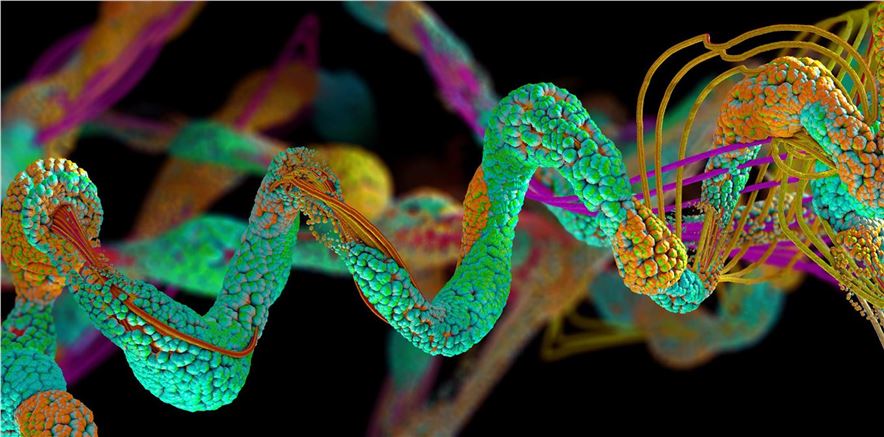In various studies and applications, it is essential to stabilize proteins for extended periods, especially in the presence of proteases. Proteins often lose their structural stability and functional activity under protease conditions. Therefore, it is imperative to develop methods to screen for protease-stable variants of protein domains. Phage display technology is a widely used and highly effective method for screening such variants. Leveraging our extensive field experience and advanced phage display platform, Creative Biolabs offers comprehensive services to support the development of protease-stable variants of protein domains.

Phages fd and M13 are invaluable tools for stable variants of protein domain screening. They not only facilitate the screening of thermal stable variants of protein domain but also play a crucial role in identifying protease-stable variants. These phages exhibit remarkable resistance to proteolytic inactivation by site-specific proteases like trypsin, chymotrypsin, and GluC. Phages fd and M13 remained fully infectious after 1 h of incubation with 2.5 uM trypsin or chymotrypsin (37°C, pH 7.0) or 1 μM pepsin (15°C, pH 4.0).
A study investigated the co-incubation of three phage variants and phage without guest proteins with various proteases (trypsin, proteinase K, and chymotrypsin) under diverse conditions. This study introduced a rapid and stable screening method for protein variants by exploiting the relationship between protein stability and its resistance to protein hydrolysis. Protein hydrolysis stability correlates with the infectivity of filamentous phages. This screening method enables the selection of slightly more stable variants from a broader set. The variant most often found during selection with RNaseT1 is only about 1 kJ/mol more stable than the second most stable variant. Notably, the method does not rely on specific protein properties like ligand binding or biological activity. Therefore, it is generally applicable to globular proteins, especially when a large number of sequences can be generated (e.g., through error-prone PCR and gene shuffling). However, this method necessitates that the inserted proteins do not disrupt phage assembly or infectivity. Consequently, it may be best suited for compact monomeric proteins. Stabilizing large multi-structural domain proteins or proteins with flexible yet essential regions using this screening method might prove challenging. Nevertheless, due to the variation in protease nature and concentration during the selection step, suitable conditions for stabilizing large proteins with numerous potential cleavage sites can be identified.
When dealing with proteins that exhibit high initial stability and low susceptibility to proteases, the protein into which the phage is inserted can be destabilized by increasing the temperature or by adding a denaturant (e.g., GdmCl) during the selection step. Alternatively, destabilizing mutations can be introduced into the protein prior to selection (using suppression mutation techniques). The effects of mutations are usually approximately additive, so newly discovered stabilizing mutations can be introduced into the original wild-type protein, similar to what was done with RNaseT1, to obtain a stabilized end product. Stabilizing mutations identified in the selection of variants without natural disulfide bonds also stabilized natural proteins with intact disulfide bonds. Researchers attribute this sensitivity to the fact that the selection step (protein hydrolysis) occurs mainly in vitro. The conditions of this step can be controlled and adjusted individually, with the range of conditions limited only by the requirements of the specific protease used and the stability of the phage. This method benefits from additional in vivo selection during phage proliferation. Phages with stable protein insertion fragments may be more soluble, more resistant to intracellular protein hydrolysis, and more efficiently assembled. Filamentous phages remain infectious even after prolonged detachment from the cell. To prevent proteins from denaturing in organic solvents or acidic/alkaline media, phages can be selected by incubating them under these extreme conditions followed by protein hydrolysis. If the intrinsic stability of the fd phage itself remains low and unsuitable for a specific application, it can be increased through multiple rounds of mutagenesis and individual selection of phages under the appropriate conditions. Such procedures can enhance the tolerance of fd phage to alkaline pH, proving particularly useful for stabilizing enzymes in industrial processes. The screening methods described by these researchers have a wide range of applications in protein research and practical applications.
Creative Biolabs possesses extensive knowledge and experience in screening stable variants of protein domains. We would be delighted to share our expertise with you on screening protease-stable variants of protein domains.
All listed services and products are For Research Use Only. Do Not use in any diagnostic or therapeutic applications.
| USA:
Europe: Germany: |
|
|
Call us at: USA: UK: Germany: |
|
|
Fax:
|
|
| Email: info@creative-biolabs.com |
